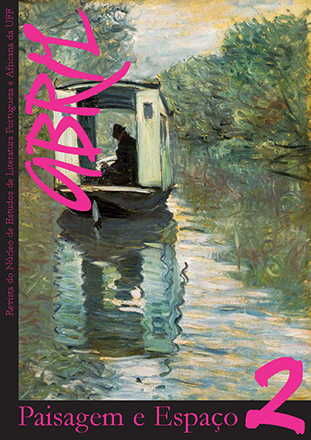As impermanências da paisagem em ‘Terra sonâmbula’: sonho e resistência
DOI:
https://doi.org/10.22409/abriluff.v2i2.29824Palavras-chave:
ficção moçambicana, paisagem, resistênciaResumo
Este artigo pretende analisar como a linguagem romanesca de Mia Couto, em Terra sonâmbula (2007), é permeada de incertezas e pelo elemento onírico, o que a aproxima do realismo fantástico.O sonho e as mudanças sucessivas da paisagem apresentam-se como marcos de resistência. A escrita do autor representa um impactante questionamento acerca da situação sofrida do povo moçambicano, atropelado por uma guerra civil que se seguiu à da Independência.Nesse país imerso numa profunda crise econômica e cultural, a ficção de Mia Couto mostra a resistência “heróica” daqueles que, por uma veia mítica e pelos caminhos da tradição oral (num processo em que o resgate dessa tradição é um dos pilares principais dessa conquista), ainda “ousam” sonhar e ter esperança, não obstante estarem mergulhados em situações de barbárie, arbitrariedades e abusos de poder. Ficção que potencializa o valor dos sonhos e o seu talento para converter e regenerar a vida, faz emergir uma literatura engajada no âmbito histórico e também social, que cria e recria o real opressor e opressivo, traços gritantes no Moçambique colonial e pós-colonial.
Downloads
Downloads
Publicado
Edição
Seção
Licença
Autorizo a Revista Aabril - NEPA/UFF a publicar o artigo que ora submeto, de minha autoria/responsabilidade, caso seja aceito para publicação online. Declaro, ainda, que esta contribuição é original, que não está sendo submetida a outro editor para publicação, e assino a presente declaração como expressão da verdade.
Os trabalhos publicados no espaço virtual da Revista Abril serão automaticamente cedidos, ficando os seus direitos autorais reservados à Revista Abril. Sua reprodução, total ou parcial, é condicionada à citação dos autores e dos dados da publicação.

A Revista Abril utiliza uma Licença Creative Commons - Atribuição-NãoComercial 4.0 Internacional (CC BY-NC 4.0).









